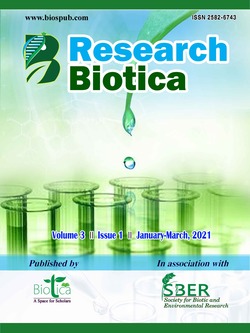
Precision Agriculture: Future Demand of India
Sunil*
Dept. of Agronomy, CCS Haryana Agricultural University, Hisar, Haryana (125 004), India
Paras
Dept. of Genetics & Plant Breeding, CCS Haryana Agricultural University, Hisar, Haryana (125 004), India
Deepak Loura
Dept. of Agronomy, CCS Haryana Agricultural University, Hisar, Haryana (125 004), India
Akshit
Dept. of Agronomy, CCS Haryana Agricultural University, Hisar, Haryana (125 004), India
Sushil Kumar
Dept. of Agronomy, CCS Haryana Agricultural University, Hisar, Haryana (125 004), India
Shalu
Dept. of Agronomy, CCS Haryana Agricultural University, Hisar, Haryana (125 004), India
DOI: https://doi.org/10.54083/ResBio/3.1.2021.01-09
Keywords: Chemical, Environment, GIS, GPS, Pollution, Site specific management
Abstract
Precision farming is a feasible approach for sustainable agriculture. Precision farming makes use of remote sensing to macro-control of GPS to locate precisely ground position and of GIS to store ground information. It precisely establishes various operations, such as the best tillage, application of fertilizer, sowing, irrigation, harvesting etc., and turns traditional extensive production to intensive production according to space variable data. Precision farming not only may utilize fully resources, reduce investment, decrease pollution of the environment and get the most of social and economic efficiency, but also makes farm products, the same as industry, become controllable, and be produced in standards and batches. The use of inputs (fertilizers and pesticides) based on the right quantity, at the right time, and in the right place. This type of management is commonly known as “Site-Specific Management”. The productivity gains in global food supply have increasingly relied on expansion of irrigation schemes over recent decades, with more than a third of the world's food now requiring irrigation for production. However, precision farming has been confined to developed countries. Land tenure system, smaller farm size and crop diversity have limited the scope of precision farming in India. However, there is a wide scope for precision farming in irrigated/ commercial/ fruit and vegetable crops/ high value crops. It is apparent that there is a tremendous scope for precision farming in India as well and it is necessary to develop database of agriculture resources, which will act as decision support system at the farm.
Downloads
not found
Reference
Adamchuk, V.I., Hummel, J.W., Morgan, M.T., Upadhyaya, S.K., 2004. On-the-go soil sensors for precision agriculture. Computers and Electronics in Agriculture 44, 71-91.
Batte, M.T., VanBuren, F., 1999. Precision farming - Factors influencing profitability. In: Northern Ohio Crops Day Meeting, Wood County, Ohio (Volume 21).
Berntsen, J., Thomsen, A., Schelde, K., Hansen, O.M., Knudsen, L., Broge, N., Hougaard H., Horfarter, R., 2006. Algorithms for sensor-based redistribution of nitrogen fertilizer in winter wheat. Precision Agriculture 7, 65-83.
Bonham, J., Bosch, D., 2001. The value of spatial information in evaluating pollution control policies in agriculture. In: Selected Paper: American Agricultural Economists Association Annual Meeting. 5-8, August, 2001. Chicago, Illinois, USA. URL: http://agecon.lib.umn.edu/cgi-bin/view.pl.
Bowman, K., 2008. Economic and environmental analysis of converting to controlled traffic farming. In: 6th Australian Controlled Traffic Farming Conference, Dubbo. pp. 61-68.
Braden, J.B., Netusil, N.R., Kosobud, R.F., 1994. Incentive‐based nonpoint source pollution abatement in a reauthorized clean water act. Jawra Journal of the American Water Resources Association 30(5), 781-791.
Chen, F., Kissel, D.E., Clark, R., West, L.T., Rickman, D., Luval, J., Adkin, W, 1997. Determining surface soil clay concentration at a field scale for precision agriculture. University of Georgia, Huntsville.
Doruchowski, G., Balsari, P., Zande, J.C., 2009. Precise spray application in fruit growing according to crop health status, target characteristics and environmental circumstances. In: Proceeding of 8th Fruit, Nut and Vegetable Production Engineering Symposium. Concepcion-Chile, pp. 494-502.
Ferguson, R., Dobermann, A., Schepers, J., 2007. Precision agriculture: Site-specific nitrogen management for irrigated corn. University of Nebraska Lincoln Extension Bulletin. pp. 1-7.
Ferreiro-Arman, M., Da Costa J.P., Homayouni, S., 2006. Hyperspectral image analysis for precision viticulture. In: Image Analysis and Recognition. (Eds.) Campilho, A. and Kamel, M. ICIAR 2006. Lecture Notes in Computer Science, Volume 4142. Springer Berlin Heidelberg. pp. 730-741.
Fountas, S., Blackmore, S., Ess, D., Hawkins, S., Blumhoff, G., Lowenberg-Deboer, J., Sorensen, C.G., 2005. Farmer experience with precision agriculture in Denmark and the US Eastern Corn Belt. Precision Agriculture 6(2), 121-141.
Griepentrog, H.W., Kyhn, M., 2000. Strategies for site specific fertilization in a highly productive agricultural region. In: Proceedings of the 5th International Conference on Precision Agriculture. (Eds.) Robert, P.C., Rust, R.H. and Larsen, W.E. ASA/CSSA/SSSA, Madison, WI, USA. pp. 1-10.
Lang, L., 1992. GPS, GIS, remote sensing: An overview. Earth Observation Magazine 1992, 23-26.
Lowenberg, D.J., Swinton, S., 1997. Economics of site-specific management in agronomic crops. In: The State of Site-Specific Management for Agriculture USA. (Eds.) Pierce, F. and Sadler, E. ASA-CSSA-SSSA, Madison, Wisconsin, USA. pp. 369-396.
Mandal, D., Ghosh, S.K., 2000. Precision farming: The emerging concept of agriculture for today and tomorrow. Current Science 79(12), 1644-1647.
Meyer-Aurich, A., Matthes, U., Osinski, E., 2001. Integrating sustainability in agriculture-trade-offs and economic consequences demonstrated with a farm model in Bavaria. In: 2001 Annual Meeting, August 5-8, Chicago, IL 20563, American Agricultural Economics Association (New Name 2008: Agricultural and Applied Economics Association).
Meyer, A., Matthes, U., Osinski, E., 2001. Integrating Sustainability in Agriculture - Trade-offs and Economic Consequences Demonstrated with a Farm Model in Bavaria. In: Selected Paper: American Agricultural Economists Association Annual Meeting. August 5-8, 2001. Chicago, Illinois. URL: http:// agecon.lib.umn.edu/cgi-bin/view.pl.
Njoroge, J.B., Ninomiya, K., Kondo, N., 2002. Automated fruit grading system using image processing. In: Proceedings of the 41st SICE Annual Conference, Osaka, Japan. pp. 1346-1351.
Ojeda, H., Carrillo, N., Deis, L., 2005. Precision viticulture and water status II: Quantitative and qualitative performance of different within field zones, defined from water potential mapping. In: XIV International GESCO Viticulture Congress, Geisenheim, Germany. pp. 741-748.
Shibusawa, S., 2002. Precision farming approaches to small farm agriculture. Agro-Chemicals Report 2(4), 13-20.
Timmermann, C., Gerhards, R., Krohmann, P., Sokefeld, M., Kuhbauch, W., 2001. The economical and ecological impact of the site-specific weed control. In: Proceedings of the 3rd European Conference on Precision Agriculture. (Eds.) Blackmore, S. and Grenier, G. AGRO Montpellier, France. pp. 563-568.
Trimble, 2005. Precision agriculture. Available at: www.trimble.com. Accessed on: December 11, 2019.
